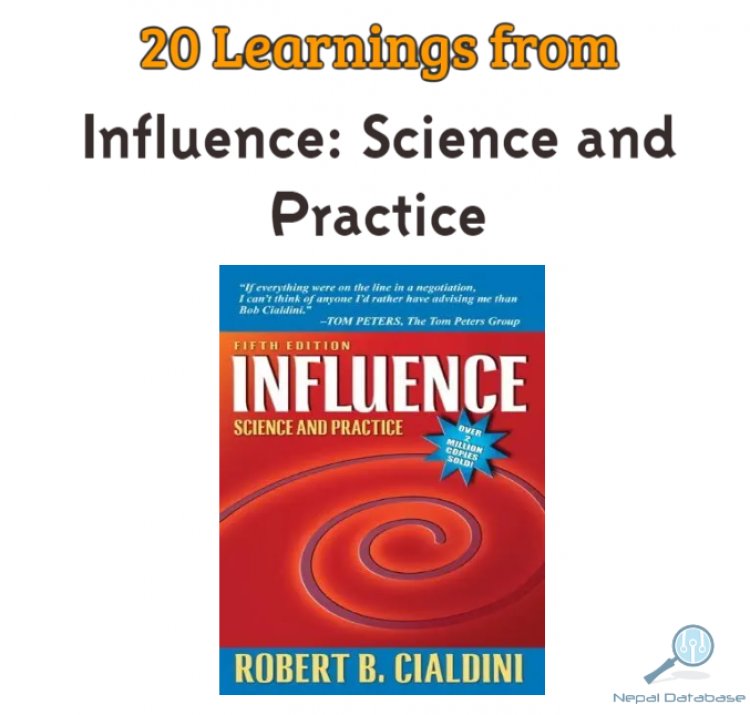20 Key Learnings from "Influence: Science and Practice" by Robert Cialdini
Learn the 20 most important principles of persuasion from the renowned book "Influence: Science and Practice" by Robert Cialdini. Understand the psychology of persuasion and how to use it in everyday life with these key learnings.

"Influence: Science and Practice" is a classic book written by Robert Cialdini, a renowned social psychologist, that explores the psychology of persuasion and how it can be used in everyday life. The book is based on years of scientific research and presents several key principles of persuasion that can be used to influence people's behavior. These principles include the principles of liking, authority, scarcity, social proof, consistency, reciprocity, and self-perception, among others. Understanding these principles can help individuals and organizations be more effective in their communication and persuasion efforts
-
The Principle of Liking
People are more likely to comply with requests from those they like. Factors that increase liking include physical attractiveness, similarity, and compliments. -
The Principle of Authority
People are more likely to comply with requests from those in positions of authority. Factors that increase perceptions of authority include clothing, titles, and assertive behavior. -
The Principle of Scarcity
People are more likely to comply with requests for something that is scarce or becoming scarce. -
The Principle of Social Proof
People are more likely to comply with requests when they see others doing the same. -
The Principle of Consistency
People are more likely to comply with requests when they are consistent with their past behavior. -
The Principle of Reciprocity
People are more likely to comply with requests when they feel they have received something first. -
The Principle of Self-Perception
People will adjust their attitudes and behaviors to be consistent with how they see themselves. -
The Principle of Self-Esteem
People are more likely to comply with requests when their self-esteem is threatened. -
The Principle of Self-Interest
People are more likely to comply with requests when they perceive that it will benefit them. -
The Principle of Self-Presentation
People are more likely to comply with requests when it will enhance their image.\ -
The Principle of Self-Disclosure
People are more likely to comply with requests when they disclose personal information about themselves. -
The Principle of Self-Efficacy
People are more likely to comply with requests when they believe they can successfully complete the task. -
The Principle of Self-Determination
People are more likely to comply with requests when they feel in control of the situation. -
The Principle of Self-Monitoring
People are more likely to comply with requests when they are aware of their behavior and its impact on others. -
The Principle of Self-Regulation
People are more likely to comply with requests when they have a plan to regulate their behavior. -
The Principle of Self-Awareness
People are more likely to comply with requests when they are aware of their own thoughts and feelings. -
The Principle of Self-Deception
People are more likely to comply with requests when they deceive themselves about the true nature of the request. -
The Principle of Self-Knowledge
People are more likely to comply with requests when they have accurate self-knowledge. -
The Principle of Self-Fulfillment
People are more likely to comply with requests when they feel that it will lead to self-fulfillment. -
The Principle of Self-Realization
People are more likely to comply with requests when they feel that it will lead to self-realization.
In conclusion, "Influence: Science and Practice" is an essential read for anyone interested in understanding the psychology of persuasion. The book provides valuable insights into the key principles of persuasion and how they can be used to influence behavior. By understanding these principles, individuals and organizations can improve their communication and persuasion efforts, which can lead to greater success in their personal and professional lives. Overall, "Influence: Science and Practice" is a comprehensive and well-researched book that offers a wealth of information on the subject of persuasion. It is a must-read for anyone looking to improve their ability to influence and persuade others.
What's Your Reaction?







































































































